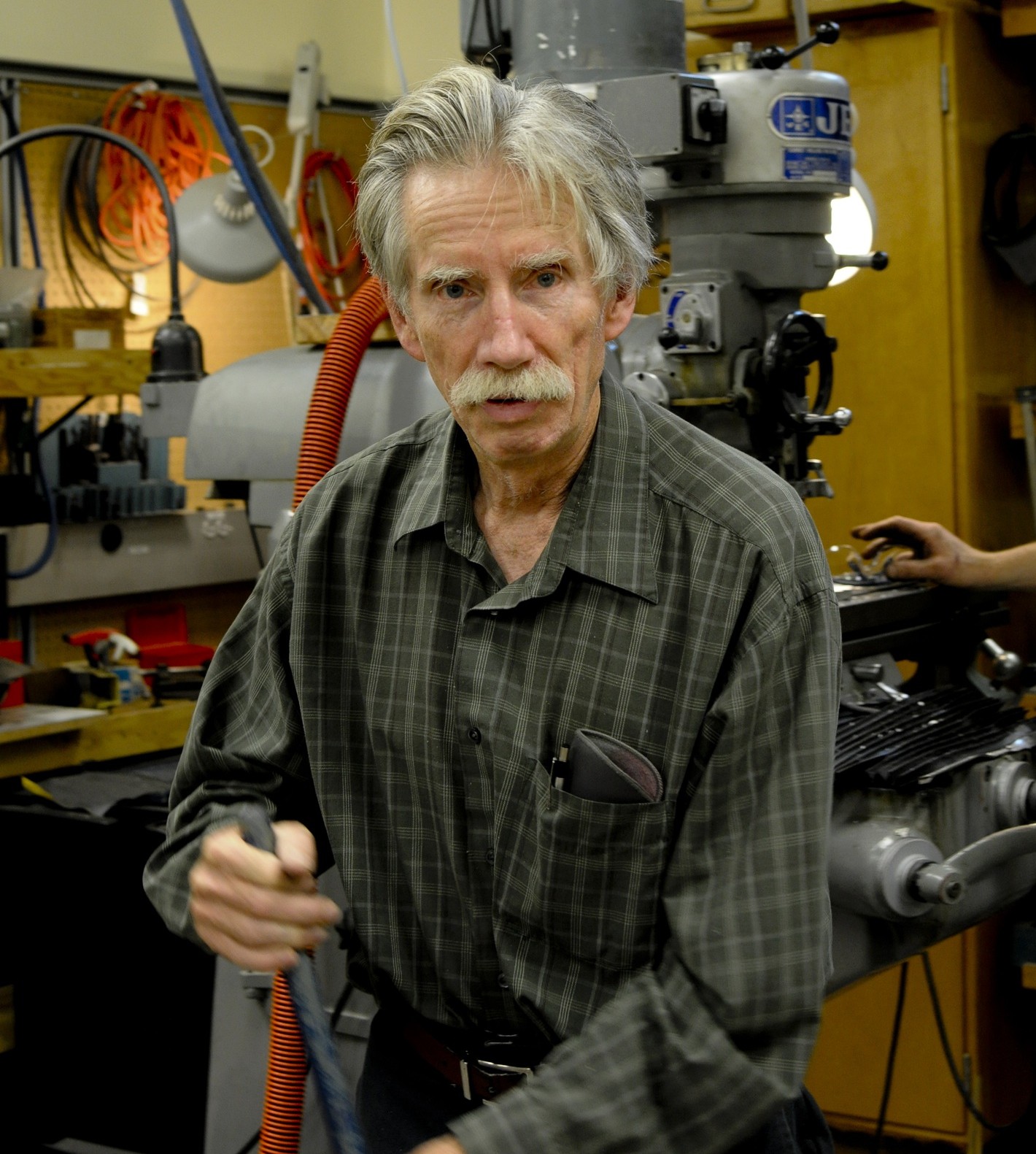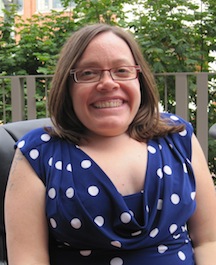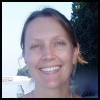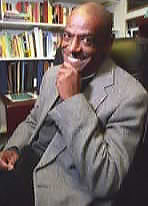
When I first walked into Physics professor Alan Thorndike’s office, he was in the midst of giving a graduated student a red puffy jacket that was big enough and warm enough to double as a sleeping bag, along with a tent that he hadn’t used in 40 years but claimed would be able to survive most of the elements. Thorndike’s office is filled with ticking machines, handmade from wood and metal. There is a three-hour clock with one hand designed by Ben Franklin and a model of an Antikythera mechanism, the oldest known complex scientific calculator, which he built with Physics and Science, Technology and Society Professor James Evans. Thorndike’s handiwork is present in many locations around the Puget Sound campus; he also created the complicated Penrose tiling inlay below the pendulum in Harned Hall.
During my interview I heard about his stint on the North Pole, his urge to climb mountains after college, and how the students have improved over his 29 years at Puget Sound. Although he claims that what you see is what you get, Professor Thorndike is not to be underestimated—I learned he used to do 24-hour bike time trials, has never had a cup of coffee and enjoys dancing the tango. This is an excerpt from a longer interview, and I encourage all students to spend some time with Thorndike. After all, he has an open offer to all students to come out sailing with him on Sundays; just stop by his office on Friday to check on weather conditions. With this being his last year here, there are only so many Sundays left to get to know one of our longest-serving and most adventurous professors.
What made you study physics?
Well, the truth is I didn’t study much physics. I didn’t want to be a physicist. I wanted to be anything but a physicist. I grew up in a family where there were physicists all over the place and I didn’t want anything to do with it. So I studied geology and mathematics in school and later found myself in graduate school at the University of Washington and studied glaciology, and after doing that for 20 years, decided what really interested me in that work was the physics content of it. So, I started looking for a job at a small school teaching physics and ended up here.
What about physics interests you? You teach quantum mechanics which seems pretty far from geology and glaciology.
I don’t know, my life has gone through a few different stages where I’m real interested in something and then I’ll drop it and get real interested in something else. I’ve always liked explaining things to people, I’ve always liked the teacher-student relationship, I could probably be happy in some other discipline too. But I kind of like the idea in physics that there are right answers and wrong answers. When that happens, you get some insight into our physical situation, which I find satisfying.
What are some of the surprises or changes that you’ve seen happen in the fields you study?
Well, early in my career I studied the sea ice that floats on the surface and I remember the worldview, or picture of that situation, was that it was a steady static thing and if we learned the annual cycle of what’s going on, it would just keep repeating it over and over again, year after year. But what we found out is that it is a very dynamic place and we may not have any sea ice in a little while. So, there’s a real surprise. We were just naïve to think there would be some sort of equilibrium situation.
Did you live on the North Pole, the Arctic Circle?
Yes, I spent about two years drifting around on a piece of sea ice.
So you really knew what it was like to be sea ice? You were one with the sea ice?
What I found most seductive about being out on the sea ice was how refined the environment was. There are only a few things that tickle your senses. Everything is gray, there is very little light. No color. No light. There is no sound. There is just ice. And water and sky. Half the year there is no light. Very refined.
And you also did mountaineering as well?
Like I said, I go through these stages. When I was your age, just graduated from college, the thing I wanted most was to be high on a cliff with space under my feet. That is what piqued my interest in the Pacific Northwest, because you could do alpine climbing all year round.
So why did you stop, did something else pique your interest?
No, I think it was more a case of losing interest because of new responsibilities in terms of a family. I had a few friends that had serious accidents doing alpine climbing, so one day it wasn’t as important to me anymore.
What other interests have you had?
Oh let’s see. I went through a woodworking phase, a bike-riding phase, a running phase, various phases at work on things that captured my interest.
What kind of bike riding did you do?
Well, I used to like to go far. So I did a couple of 24-hour time trials.
No way. Where do you go for 24 hours?
These particular rides were put on by a bike club out of Seattle, and they would mark off a six-mile loop over in Puyallup and you went around this six-mile loop. So I did that, and also did the Seattle-Portland ride.
You see, I was never very good at this. I knew I couldn’t beat most people, but I could probably stay in the saddle longer than most.
Where does your mind go during a 24-hour bike ride?
It goes to a different place, I can tell you that. I remember the sensation of watching the shadows of the telephone poles, and you’d come around the loop again to that same pole and the shadow was different. You get the sensation of the shadow just slowly sweeping around. And I looked at it 60 times throughout the day, and I noticed it was in over here in the morning and over here in the afternoon. So, it doesn’t take much to occupy the mind.
How did you start taking students out sailing on Sundays? And how often do you do it?
Well, I’m not allowed to go out by myself. It’s been fun to do it with students. I used to do it every weekend, all year round, but I’m finding less students are interested these days. So some weekends we don’t go but I’ve taken about 300 students on the boat. I usually just say in class on Friday, ‘does anyone want to go sailing?’ And word spreads around, students will come and knock on the door and say, “I hear you have a boat.”
What’s an interesting change you have seen in your 29 years at Puget Sound?
Oh, the sidewalks.
Well, that’s a serious answer because a lot of what you notice looking back on the years is that a lot about the physical campus has changed. A lot of new buildings, the landscaping is very different.
The students are better than they were when I first came. When I first came there were a lot of students that weren’t prepared for college. [Puget Sound] at that time was trying to serve everyone’s needs and it was going through a process of finding its mission, so that’s a change. But I look forward to coming to work everyday. There hasn’t been a day that I haven’t wanted to be here. Walking onto campus, being surrounded by the comfortable layout of the facilities, the good colleagues, good students, good material to teach.
What would you do if you weren’t a professor?
Oh, well I’m about to find that out. My new occupation is building toys for my grandson.
If you go back years and years, if you were on a different path what could you see yourself doing?
When I was in junior high school I remember taking an aptitude test for different vocations and a school counselor saying, “You know, Alan, you’re a smart boy, you can be anything you want, just not a teacher.”
Is there anything about you that would really surprise people?
I don’t know, what you see is what you get. People were surprised the other night at the faculty dinner, there was a bunch of tango music and Louise and I got up and danced. People were very surprised to see this old guy still had some moves.
Is there any advice you would give students?
Well, I have a hard time giving advice because I’ve made a lot of peculiar decisions and things worked out OK for me. I like to tell students as they’re getting ready to move on and thinking about what they’ll do, that there is no right or wrong answer to that question. You just have to go one step at a time. Do something that will be a learning experience for you.
The great thing about this country is that it’s pretty easy to make changes. It’s a very common thing in graduate school to change departments and change subjects of study.
Well, is there anything else I should ask you about that I haven’t yet already?
Well, there was a newspaper interview with Paul Dirac who is a British physicist visiting University of Wisconsin, and the interviewer asked him what he liked most about America and he said, “Potatoes.”
So, ask me another question.
Ok, what do you like most about America?
Potatoes.
PHOTO COURTESY / DANIEL PENDLETON



